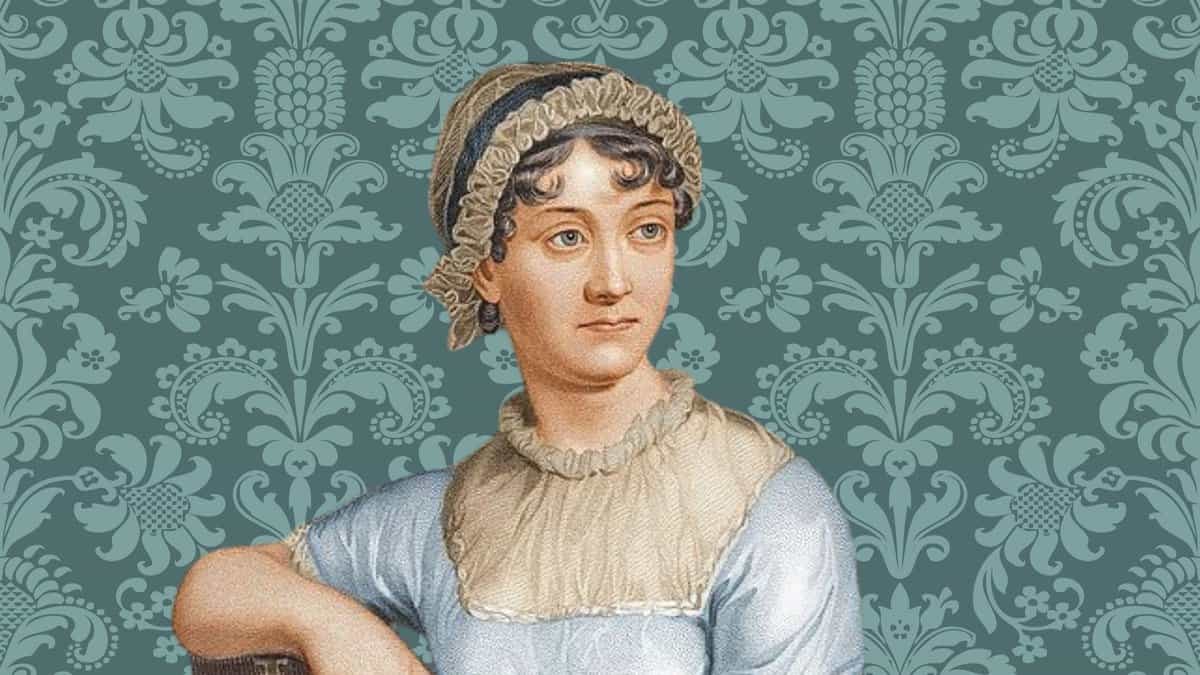Last Updated on April 26, 2024 by BiblioLifestyle

Jane Austen is one of the most beloved and well-known writers of all time. Her stories have captured the hearts and imaginations of readers all over the world, and her legacy continues to live on today. From her humble beginnings in the small English village of Steventon to her enduring impact on literature and culture, Jane Austen’s life was filled with creativity, passion, and dedication. In this article, I’ll share more about the fascinating life of Jane Austen and her legacy.
About Jane Austen’s Life
Early Life And Upbringing
Born on December 16, 1775, in Steventon, Hampshire, England, Jane Austen was the seventh of eight children. Her father, George Austen, was the local rector and well-respected in the community. Her mother, Cassandra Leigh Austen, was a dedicated wife and homemaker. Despite the family’s relatively comfortable lifestyle, Jane’s parents had to be mindful of their finances because they had a large family to support. But from an early age, Jane was surrounded by books and encouraged to pursue her writing skills by her father.
Literary Influences And Education
Jane’s formal education was somewhat limited, and she was mostly home-schooled by her father and older brothers. However, the family’s love of literature and the arts meant that Jane was exposed to a wide range of writers and works from a young age. Plus her parents also encouraged her to write her own stories and plays, which she did with great enthusiasm.
Personal Life And Relationships:
Despite her literary success, Jane Austen’s personal life was marked by tragedy and struggle. She experienced several failed romances, including one with a young man named Tom Lefroy, which inspired her novel Pride and Prejudice. Her life partner was her sister Cassandra, who was also a spinster and with whom Jane lived with. She also faced financial difficulties throughout her life and was forced to rely on her family’s support.
Did Jane Austen believe in marriage?
Yes, Jane Austen did believe in marriage, but not solely for economic benefits or social status, as was common in her time. Her novels often emphasize the importance of marrying for love and intellectual compatibility. Austen’s heroines, such as Elizabeth Bennet in “Pride and Prejudice” or Anne Elliot in “Persuasion,” refuse offers of marriage that would provide financial security but lack emotional connection, ultimately marrying men they love and respect. While Austen never married herself, her writing suggests that she valued and believed in the institution of marriage when it was based on mutual respect, affection, and understanding.
Jane Austen’s Works
First Published Works And Early Success:
Jane’s first novel, Sense and Sensibility, was published in 1811 and was an immediate success. This was followed by several other novels, including Pride and Prejudice, Mansfield Park, and Emma. Despite her success as a writer, Jane remained modest and dedicated to her craft, and she continued to write without seeking celebrity or fame.
Jane Austen’s books, in order of publication:
- Sense and Sensibility
- Pride and Prejudice
- Mansfield Park
- Emma
- Northanger Abbey
- Persuasion
For a list of all of Jane Austen’s works, including her early writings and incomplete works, check out A Comprehensive Guide to Jane Austen Books in Order.
Writing Style And Themes:
Jane Austen’s writing style was characterized by sharp wit, biting social commentary, humor, and a keen sense of observation. Her stories often explored the lives of women in the late 18th and early 19th centuries, focusing on issues such as marriage, social status, and the role of women in society. Her ability to create fully realized characters and nuanced relationships has endeared her to readers for generations.
Reception And Criticism:
While Jane’s novels were popular with readers, they also drew criticism from some quarters. Some critics felt that her writing was too focused on the lives of a narrow slice of society, while others found her characters to be flat and one-dimensional. However, her works continued to be widely read, and her popularity only grew after her death in 1817.

Jane Austen’s Legacy
Adaptations of Jane Austen’s Novels Into Various Forms of Media
Perhaps one of the most remarkable things about Jane Austen’s legacy is that it has endured for over two centuries. Her stories have been adapted into countless movies, TV shows, and plays, and her writing continues to inspire new generations of readers and writers alike. Her themes of love, friendship, and self-discovery are timeless and universal, and her stories have a way of resonating with people of all ages and backgrounds. Here are some notable adaptations:
Movies:
- Pride and Prejudice has been adapted into several films, the most famous being the 2005 version featuring Keira Knightley and Matthew Macfadyen. However, many Austen fans still hold a soft spot for the 1940 adaptation starring Greer Garson and Laurence Olivier.
- Sense and Sensibility was beautifully adapted into a film in 1995, with Emma Thompson both writing the screenplay and starring as Elinor Dashwood. The movie garnered seven Academy Award nominations.
- Emma has also seen multiple film versions, including a 1996 adaptation with Gwyneth Paltrow and a more recent one in 2020 featuring Anya Taylor-Joy.
TV Series:
- Pride and Prejudice was transformed into a beloved BBC miniseries in 1995, featuring Jennifer Ehle and Colin Firth. This adaptation is renowned for its faithful depiction of the novel and is cherished by Austen enthusiasts.
- Emma was the focus of a critically acclaimed 2009 BBC miniseries starring Romola Garai and Jonny Lee Miller.
- Sanditon, an unfinished novel by Austen, has been turned into a TV series by ITV, giving viewers a glimpse of what might have been Austen’s final masterpiece.
Theater Plays:
- Pride and Prejudice has been brought to the stage many times, with a notable recent adaptation by the Regent’s Park Open Air Theatre in London.
- Sense and Sensibility was adapted into a playful, inventive stage production by Kate Hamill in 2014.
- Mansfield Park has been translated into a musical format, with Jonathan Dove’s chamber opera version enjoying success on the stage.
Jane Austen’s Influence on Modern Literature and Popular Culture
The impact of Jane Austen’s work extends far beyond her six primary novels. She’s considered a pioneering figure in the use of realism, social commentary, and free indirect speech in literature. These techniques are now widely used in modern literature today. Plus, her novels have served as a blueprint for the contemporary romance genre, which has shaped the structure and themes of these stories.
In popular culture, Austen’s influence is vast and varied. Her novels have inspired a variety of spin-offs, including novels, films, and TV shows that reimagine or extend her original stories. For instance, the novel “Bridget Jones’s Diary” and its subsequent film adaptations are famously based on “Pride and Prejudice.” Furthermore, the advent of “Austenmania” in the 1990s and beyond has led to a resurgence in the popularity of period dramas, often featuring strong-willed heroines and intricate social dynamics reminiscent of Austen’s works.
The popularity of Austen’s work in the 21st century can also be seen in the proliferation of Jane Austen’s fan fiction on the internet. Her characters and plots continue to be beloved and relevant in the modern era, indicating the timeless appeal of her keen observations of human nature and social dynamics. Plus the fact that her novels continue to be studied, analyzed, reinterpreted, and enjoyed more than 200 years after their publication is a testament to Austen’s enduring influence on literature and popular culture.
Discover Jane Austen’s World
If you’ve been inspired by this exploration of Jane Austen’s life, work, and enduring legacy, why not delve deeper? Consider embarking on a literary pilgrimage to visit the landmarks associated with her life and her works.
- Visit the Jane Austen’s House Museum in Chawton, where she wrote or revised all her major works.
- Wander through the charming city of Bath, featured prominently in her novels “Persuasion” and “Northanger Abbey.”
- Tour the grandeur of Chatsworth House, believed to be the inspiration for Mr. Darcy’s Pemberley in “Pride and Prejudice.”
So don’t just read about her world; go out and experience it and let her timeless insight into human nature illuminate your own understanding of the world around us.

Frequently Asked Questions
What is Jane Austen famous for?
Jane Austen is famous for her classic novels, which provide a profound, critical, and often humorous overview of the British landed gentry at the end of the 18th century. Her most well-known works include “Pride and Prejudice,” “Sense and Sensibility,” “Emma,” and “Mansfield Park.” These novels are celebrated for their exploration of issues such as marriage, social status, and the role of women in society. Austen’s distinct literary style, characterized by her sharp wit and keen observational skills, has made her one of the most influential and revered authors in English literature.
Was Jane Austen a feminist?
While Jane Austen did not explicitly identify as a feminist—given that the term and its associated movement didn’t exist in her time—her novels do exhibit strong feminist themes. Austen’s work often explores the limited options available to women of her era and critiques the societal norms that confined women to the domestic sphere. Her books feature female characters who value their independence, intellect, and personal growth, showcasing their resilience and strength in a male-dominated society. So, while it’s anachronistic to label Austen as a feminist in the modern sense, her work undeniably contains elements of proto-feminism and continues to inspire feminist readings and interpretations.
What was Jane Austen’s personality like?
Jane Austen’s personality, as gleaned from letters and accounts by friends and family, was marked by a sharp wit and a keen observation of human nature. She was known to be modest, preferring a quiet life in the countryside to the hustle and bustle of the city. However, she was not shy or retiring; she enjoyed socializing within her circle and had a lively sense of humor. Austen was also deeply dedicated to her craft of writing and was incredibly disciplined and meticulous. Despite the constraints that society placed on women during her time, she was assertive and unafraid to satirize societal norms and expectations in her novels. In essence, Jane Austen was a woman of intelligence, modesty, and wit, with a remarkable ability to observe and delineate the complexities of human character and society.
How old was Jane Austen when she died?
Jane Austen passed away at the relatively young age of 41 on July 18, 1817. Despite her untimely death, she made an indelible mark on the literary world with her insightful and enduring novels.
What illness did Jane Austen die of?
Jane Austen’s cause of death has been a topic of much speculation among scholars and medical professionals. While the precise details of her illness remain unknown due to the limited medical knowledge and resources of the time, prevalent theories suggest that she may have died from Addison’s disease, a rare disorder that affects the adrenal glands. Other theories propose that she may have suffered from Hodgkin’s lymphoma, a type of cancer, or tuberculosis. However, given the lack of definitive historical medical records, her exact cause of death continues to be a subject of debate.
How religious was Jane Austen?
Jane Austen was indeed quite religious. She was a member of the Church of England, and her faith played a significant role in her life and work. Her father was a clergyman, and she regularly attended church services. While her novels are not explicitly religious, they are subtly imbued with Christian values of love, kindness, integrity, and forgiveness. Austen’s personal prayers, which have been preserved, reveal a devout woman who sought spiritual guidance and strength. However, her approach to religion was not dogmatic or judgmental; rather, it was compassionate and understanding, reflecting the humanistic aspect of her moral vision.
What denomination was Jane Austen?
Jane Austen was a member of the Church of England, the established church in England at the time and a branch of the Anglican Communion. As such, she would be considered an Anglican. Her father, Reverend George Austen, was a rector in the Anglican Church, a fact that significantly influenced Austen’s life and her writing. Despite not being overtly religious, her novels invariably reflect her Anglican upbringing and the moral and social values it espoused.
What were Jane Austen’s beliefs?
Jane Austen was a devout Anglican, and her religious beliefs found subtle expression in her novels. She believed in virtue, morality, and the principles of righteousness and often imbued her characters with these qualities. Her beliefs also extended to her views on society and the individual’s role within it. She believed in the importance of social manners and decorum and critiqued the vanity and pretensions of the upper classes. However, Austen was also acutely aware of the limitations and injustices of her society, especially in terms of gender and class. Her novels often subtly critique these structures, suggesting a belief in the importance of personal merit over inherited status.
Have you read any books by Jane Austen?
Jane Austen was so much more than just a writer. She was a revolutionary force, defying expectations and breaking down barriers with each pen stroke. Her legacy continues to inspire and delight readers all around the world, and her impact on literature and culture is immeasurable. So whether you’re a die-hard fan or a curious newcomer, take some time to discover her world – you won’t be disappointed.
What is your favorite Austen book? What book is on your TBR? How much of her literary or personal life did you know about? Let’s talk about all things Austen in the comments below!
MORE READING:
- A Comprehensive Guide to Jane Austen Books in Order
- 3 Must-Read Jane Austen Books + Where to Start
- 15 Books About and Inspired by Jane Austen
- The 31 Best Pride And Prejudice Quotes Of All Time




+ show Comments
- Hide Comments
add a comment